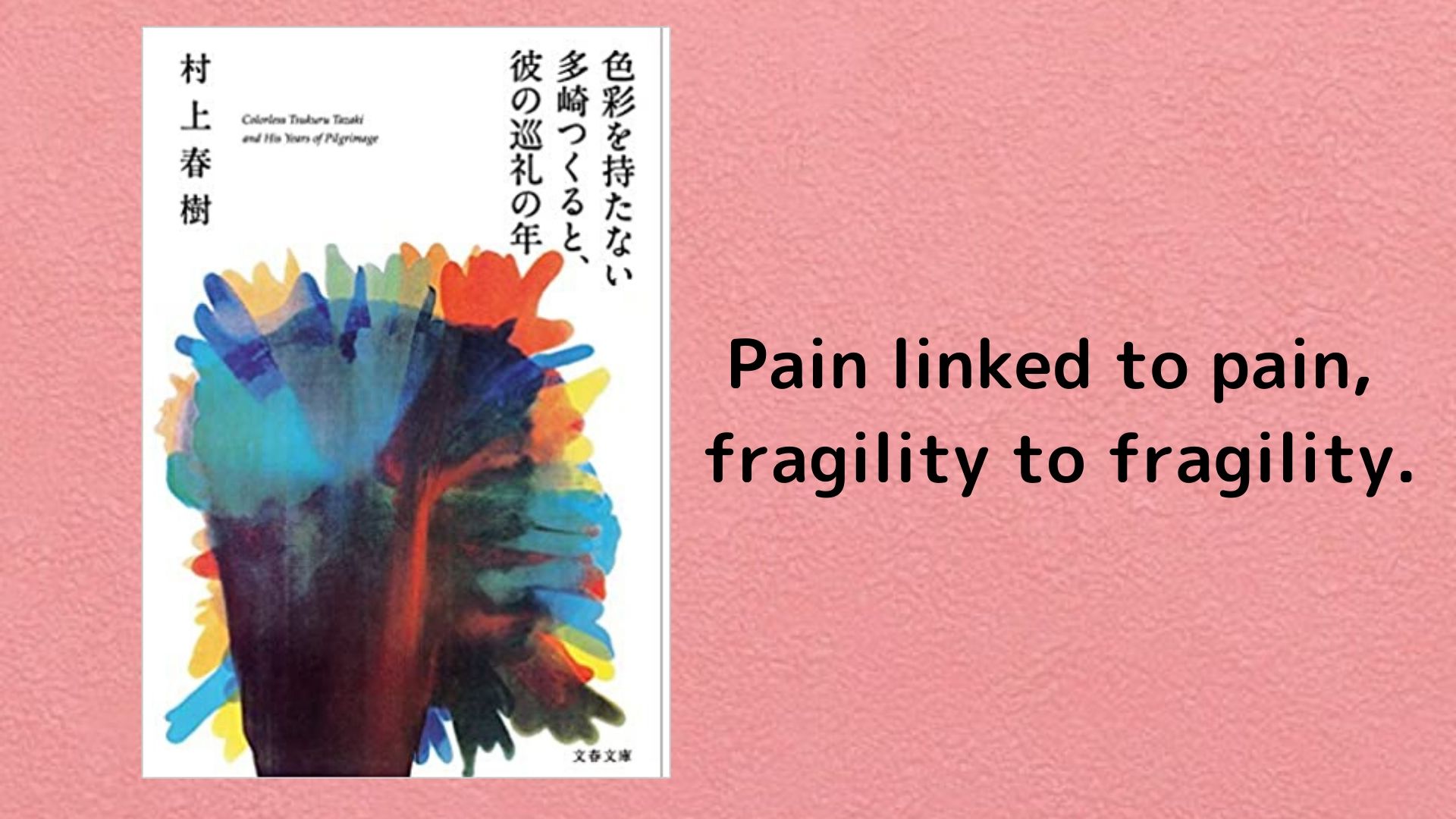今回は、村上春樹の『色彩を持たない多崎つくると、彼の巡礼の年』の名言を7個集めました。
仲がよかった昔の友達たちから、急に絶縁されるというストーリーです。
主人公は大人になったかつての友達を一人一人たずねて歩くのですが、みんなそれぞれまったく違う人生を送っています。
大人になってからの人生って、昔の友達と交わらなくなるものですよね……。
英語版はこちら。翻訳者はPhilip Gabrielです。
1
大学二年生の七月から、翌年の一月にかけて、多崎つくるはほとんど死ぬことだけを考えて生きていた。
その間に二十歳の誕生日を迎えたが、その刻み目はとくに何の意味も持たなかった。それらの日々、自らの命を絶つことは彼にとって、何より自然で筋の通ったことに思えた。なぜそこで最後の一歩を踏み出さなかったのか、理由は今でもよくわからない。
そのときなら生死を隔てる敷居をまたぐのは、生卵をひとつ呑むより簡単なことだったのに。
From July of his sophomore year in college until the following January, all Tsukuru Tazaki could think about was dying.
He turned twenty during this time, but this special watershed-becoming an adult-meant nothing.
Taking his own life seemed the most natural solution, and even now he couldn’t say why he hadn’t taken this final step.
Crossing that threshold between life and death would have been easier than swallowing down a slick, raw egg.
その間に二十歳の誕生日を迎えたが、その刻み目はとくに何の意味も持たなかった。それらの日々、自らの命を絶つことは彼にとって、何より自然で筋の通ったことに思えた。なぜそこで最後の一歩を踏み出さなかったのか、理由は今でもよくわからない。
そのときなら生死を隔てる敷居をまたぐのは、生卵をひとつ呑むより簡単なことだったのに。
From July of his sophomore year in college until the following January, all Tsukuru Tazaki could think about was dying.
He turned twenty during this time, but this special watershed-becoming an adult-meant nothing.
Taking his own life seemed the most natural solution, and even now he couldn’t say why he hadn’t taken this final step.
Crossing that threshold between life and death would have been easier than swallowing down a slick, raw egg.
2
巨大な鯨に呑まれ、その腹の中で生き延びた聖書中の人物のように、つくるは死の胃袋に落ち、暗く淀んだ空洞の中で日付を持たぬ日々を送ったのだ。
Like Jonah in the belly of the whale, Tsukuru had fallen into the bowels of death, one untold day after another, lost in a dark, stagnant void.
Like Jonah in the belly of the whale, Tsukuru had fallen into the bowels of death, one untold day after another, lost in a dark, stagnant void.
3
「記憶をどこかにうまく隠せたとしても、それがもたらした記憶を消すことはできない。それだけは覚えておいたほうがいいわ。歴史は消すことも、作りかえることもできないの。それはあなたという存在を殺すのと同じだから」
You can hide memories, but you can’t erase the history that produced them. If nothing else, you need to remember that. You can’t erase history, or change it. It would be like destroying yourself.
You can hide memories, but you can’t erase the history that produced them. If nothing else, you need to remember that. You can’t erase history, or change it. It would be like destroying yourself.
4
嫉妬とは──つくるが夢の中で理解したところでは──世界で最も絶望的な牢獄だった。
なぜならそれは囚人が自らを閉じ込めた牢獄であるからだ。誰かに力づくで入れられたわけではない。自らそこに入り、内側から鍵をかけ、その鍵を自ら鉄格子の外に投げ捨てたのだ。そして彼がそこに幽閉されていることを知る者は、この世界に誰一人いない。
もちろん出ていこうと本人が決心さえすれば、そこから出ていける。その牢獄は彼の心の中にあるのだから。
しかしその決心ができない。彼の心は石壁のように硬くなっている。それこそがまさに嫉妬の本質なのだ。
Jealousy— at least as far as he understood it from his dream— was the most hopeless prison in the world.
なぜならそれは囚人が自らを閉じ込めた牢獄であるからだ。誰かに力づくで入れられたわけではない。自らそこに入り、内側から鍵をかけ、その鍵を自ら鉄格子の外に投げ捨てたのだ。そして彼がそこに幽閉されていることを知る者は、この世界に誰一人いない。
もちろん出ていこうと本人が決心さえすれば、そこから出ていける。その牢獄は彼の心の中にあるのだから。
しかしその決心ができない。彼の心は石壁のように硬くなっている。それこそがまさに嫉妬の本質なのだ。
Jealousy— at least as far as he understood it from his dream— was the most hopeless prison in the world.
Jealousy was not a place he was forced into by someone else, but a jail in which the inmate voluntarily, locked the door, and threw away the key. And not another soul in the world knew he was locked inside.
Of course if he wanted to escape, he could do so. The prison was, after all, his own heart.
But he couldn’t make that decision. His heart was as hard as a stone wall. This was the very essence of jealousy.
5
色彩を欠いた多崎つくるは、色彩を欠いたまま生きていけばいいのだ。それで誰かに迷惑をかけるわけではない。
Colorless Tsukuru Tazaki would just go on living his colorless life. Not bothering anybody else.
Colorless Tsukuru Tazaki would just go on living his colorless life. Not bothering anybody else.
6
人の心と人の心は調和だけで結びついているのではない。それはむしろ傷と傷によって深く結びついているのだ。
痛みと痛みによって、脆さと脆さによって繋がっているのだ。
悲痛な叫びを含まない静けさはなく、血を地面に流さない赦しはなく、痛切な喪失を通り抜けない受容はない。
それが真の調和の根底にあるものなのだ。
One heart is not connected to another through harmony alone. They are, instead, linked deeply through their wounds.
Pain linked to pain, fragility to fragility.
There is no silence without a cry of grief, no forgiveness without bloodshed, no acceptance without a passage through acute loss.
That is what lies at the root of true harmony.
痛みと痛みによって、脆さと脆さによって繋がっているのだ。
悲痛な叫びを含まない静けさはなく、血を地面に流さない赦しはなく、痛切な喪失を通り抜けない受容はない。
それが真の調和の根底にあるものなのだ。
One heart is not connected to another through harmony alone. They are, instead, linked deeply through their wounds.
Pain linked to pain, fragility to fragility.
There is no silence without a cry of grief, no forgiveness without bloodshed, no acceptance without a passage through acute loss.
That is what lies at the root of true harmony.
7
僕らはあのころ何かを強く信じていたし、何かを強く信じることのできる自分を持っていた。
そんな思いがそのままどこかに虚しく消えてしまうことはない。
We truly believed in something back then, and we knew we were the kind of people capable of believing in something—with all our hearts.
And that kind of hope will never simply vanish.
そんな思いがそのままどこかに虚しく消えてしまうことはない。
We truly believed in something back then, and we knew we were the kind of people capable of believing in something—with all our hearts.
And that kind of hope will never simply vanish.





コメント